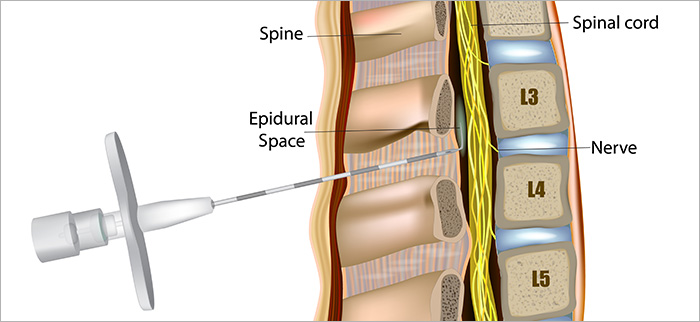An epidural is a technique that involves injecting a medicine — either an anesthetic or a steroid — into the space surrounding your spinal nerves, known as the epidural space. The purpose of epidural injection New Brunswick procedure is to offer pain relief (analgesia) or a total loss of feeling (anesthesia) for one area of your body, like your legs or belly. An epidural injection may help decrease inflammation and alleviate pain caused by certain spinal nerve diseases such as herniated discs, spondylosis, or spinal stenosis.

The distinction between an epidural and a spinal block
An epidural and a spinal block relieve pain through an injection in the region around your spine. The differences are the placement and the impact. With an epidural, your healthcare professional injects anesthesia into the epidural area surrounding your spinal nerves. Also, epidural injections often take 20 to 30 minutes before you feel the full impact of pain relief or lack of sensation.
With a spinal block, your physician injects the anesthesia into the dural sac surrounding your spinal nerves that contain cerebrospinal fluid. This insertion of a spinal block injection implies that it provides rapid relief.
What will you experience during your epidural therapy?
You will likely experience a small pinch when your clinician injects the local anesthetic to numb the region before the epidural procedure. You might feel pressure, tingling, a burning feeling, or brief shooting discomfort when your physician injects the epidural. Also, you may feel nothing.
If you experience any pain during the injection, it typically subsides once the injection is completed. You should inform your provider immediately if you feel intense sharp discomfort during or after your epidural treatment.
Can getting an epidural injection cause back problems?
There is a common misconception that having an epidural can induce back pain; however, it is extremely rare for an epidural to cause long-term or severe back issues. It is normal to have temporary back discomfort or tenderness at the location of your epidural, and it goes away within a few days.
This assumption likely stems from the fact that many women who give birth suffer back discomfort after labor and delivery — whether they have had an epidural injection or not. This is because the ligaments and bones in your pelvis are moving back into their original places from before your pregnancy, causing back pain and soreness.
What occurs after your epidural procedure
If you have had an epidural with anesthetic medicine, it will take 20 to 30 minutes for your pain relief or loss of sensation to take full effect. Epidural injections begin to work within 2-7 days, and the pain relief can last for several days or longer.
When to return to normal activities after your epidural procedure
If you have had an epidural, do not drive, use machinery or have alcohol for at least 24 hours after. Your healthcare professional will offer precise instructions about when you may resume normal activities depending on the type of epidural and your condition. You are recommended to follow them.
Epidurals are a common, effective, and typically safe method for providing immediate pain relief and a temporary loss of sensation. If you are worried about getting an epidural, don’t hesitate to ask your healthcare practitioner about it and the process. They are there to answer any inquiries you have. Call Pain & Anesthesia Care to schedule your meeting today to determine whether epidural injection treatments suit you.





